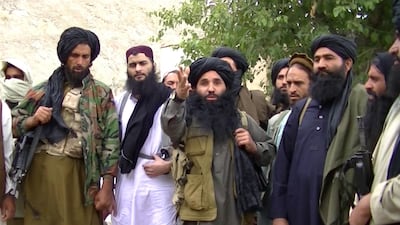The drone killing of the Pakistan Taliban leader who ordered Malala Yousafzai's death is set to plunge the group into a bitter leadership struggle that could prompt defections to ISIS, security experts have said.
The apparent death of Mullah Fazlullah after nearly five years at the head of the militant movement comes as his group has already fractured and taken refuge in Afghanistan from the Pakistan military offensives.
While the Tehrik-i-Taliban Pakistan (TTP) movement itself has not confirmed the death late last week in an American strike in the remote Afghan province of Kunar, both Kabul and Islamabad have hailed his killing as significant.
A protracted leadership dispute and infighting could now see frustrated militants switch allegiance to the local ISIS franchise, also known as Daesh, analysts said.
“It will be a big blow for the organisation and it will take time to recover,” said Muhammad Amir Rana, director of Pakistan's Institute for Peace Studies think tank.
“The TTP are already divided along tribal lines and this is a major challenge that they faced. It will be frustrating for many. Maybe the benefit will go to Daesh, the frustrated militants could join Daesh.”
ISIS has established a stubborn foothold inside Afghanistan, carrying out a series of suicide attacks that have persisted even as the group's self-proclaimed caliphate in Iraq and Syria has crumbled.
On Saturday, it underlined its rejection of peace efforts in Afghanistan by car bombing a ceasefire meeting in Nangarhar province. The attack killed at least 26, marring what had been an otherwise historic truce in which Taliban fighters and Afghan police were photographed exchanging hugs and greetings.
_______________
Read more:
Drone death of Pakistan Taliban chief Mullah Fazlullah 'significant'
Afghan president extends ceasefire as Taliban respects truce
Malala Yousafzai returns to her hometown in Pakistan for the first time since assassination attempt
_______________
ISIS has also established a growing reach inside Pakistan by recruiting militants and carrying out attacks against religious minorities, although the authorities deny it has a strong presence in the country.
From the inception of ISIS in the region, members of the TTP have switched allegiance to ISIS’s self-styled caliph, Abu Bakr Al Baghdadi. Fazlullah's death now risks adding to that.
Imtiaz Gul, head of Islamabad's Centre for Research and Security Studies think tank, said the Pakistan Taliban had already started to fragment and now faced an “intense war of succession”.
The prospect of frustrated fighters drifting to ISIS was “a possibility that is very much there”.
Fazlullah built a following with charismatic radio diatribes against the Pakistan government, polio vaccination programmes and girls' education. He ordered the assassination of schoolgirl Malala in 2012 after she wrote a blog speaking out against the Taliban. She survived the assassination attempt and went on to win the Nobel Peace Prize.
He was always a controversial choice for TTP leader, however. The group's first two emirs were from the Mehsud tribe of South Waziristan, while Fazlullah hailed from the Swat valley. His appointment in November 2013 sparked a split which the group has yet to fully recover from.
“Islamic State has grown by capitalising on disputes among existing militants,” said one western diplomatic source. “When militants fall out with local leaders, or there are schisms, they have sworn allegiance to Baghdadi.”
Fazlullah's apparent death also comes at a time when the TTP has been put on the back foot and forced to take refuge in Afghanistan. A series of offensives by the Pakistan military after the TTP's attack on an army school in Peshawar have pushed the militants over the border into an area already seen as an ISIS stronghold.
The American role in the death of Pakistan's most wanted man also highlights that relations between Islamabad and Washington are not as bad as feared.
The United States put out a US$5 million (Dh18.36m) bounty for information on Fazlullah's head earlier his year – even as Pakistan was fuming that President Donald Trump had accused the country of lies and deceit during his first tweet of 2018.
Mr Trump's Twitter accusation and his subsequent halting of $900 million of security aid caused an outcry in Pakistan.
Fazlullah's killing showed that in the background, close counter-terrorism co-operation had not been affected, analysts said
“This operation underscores the ongoing operational level co-operation between the two sides,” Mr Gul said.
“They appear to be taking care of each other's concerns.”
“Whatever the tone of the relationship between Washington and Islamabad the cooperation between them continues,” Mr Rana said.

